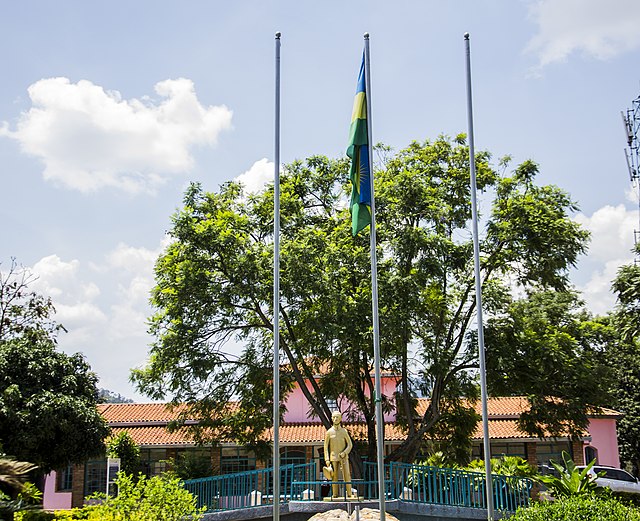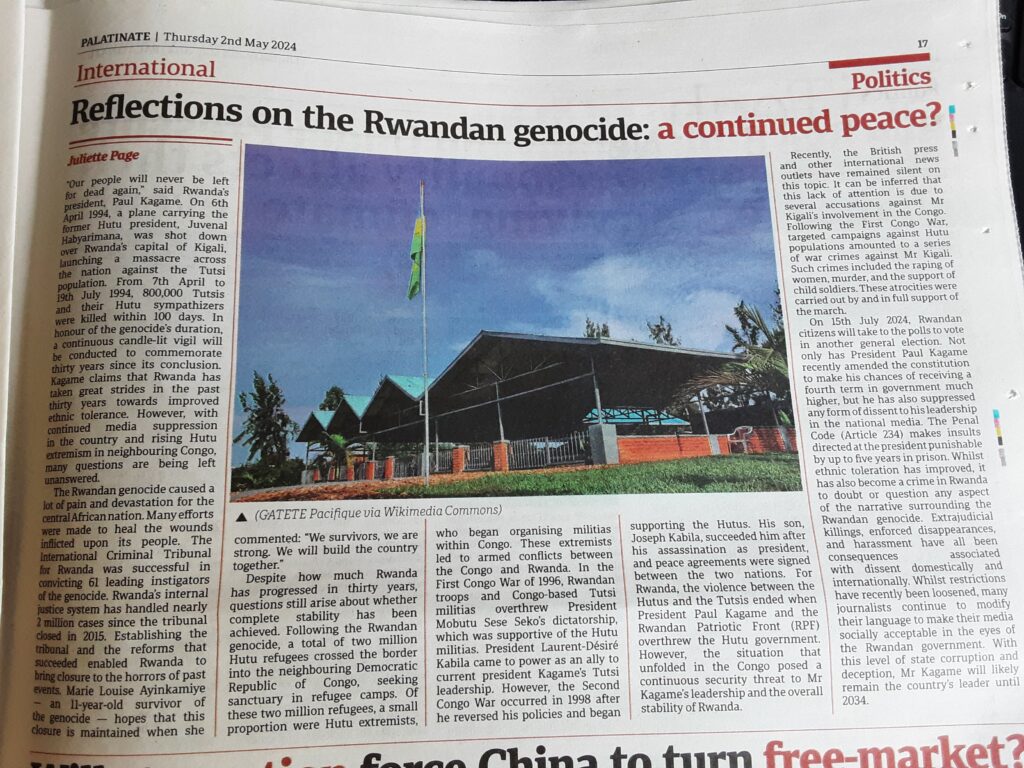Reflections on the Rwandan genocide: a continued peace?
“Our people will never be left for dead again,” said Rwanda’s president, Paul Kagame. On 6th April 1994, a plane carrying the former Hutu president, Juvenal Habyarimana, was shot down over Rwanda’s capital of Kigali, launching a massacre across the nation against the Tutsi population. From 7th April to 19th July 1994, 800,000 Tutsis and their Hutu sympathizers were killed within 100 days. In honour of the genocide’s duration, a continuous candle-lit vigil will be conducted to commemorate thirty years since its conclusion. Kagame claims that Rwanda has taken great strides in the past thirty years towards improved ethnic tolerance. However, with continued media suppression in the country and rising Hutu extremism in neighbouring Congo, many questions are being left unanswered.

The Rwandan genocide caused a lot of pain and devastation for the central African nation. Many efforts were made to heal the wounds inflicted upon its people. The International Criminal Tribunal for Rwanda was successful in convicting 61 leading instigators of the genocide. Rwanda’s internal justice system handled nearly two million cases since the tribunal closed in 2015. Establishing the tribunal and the reforms that succeeded it, enabled Rwanda to bring closure to the horrors of past events. Marie Louise Ayinkamiye – an 11-year-old survivor – hopes that this closure is maintained when she commented: “We survivors, we are strong. We will build the country together.”
Despite how much Rwanda has progressed in thirty years, questions still arise about whether complete stability has been achieved. Following the Rwandan genocide, a total of two million Hutu refugees crossed the border into the neighbouring Democratic Republic of Congo, seeking sanctuary in refugee camps. Of these two million refugees, a small proportion were Hutu extremists, who began organising militias within Congo. These extremists led to armed conflicts between the Congo and Rwanda. In the First Congo War of 1996, Rwandan troops and Congo-based Tutsi militias overthrew President Mobutu Sese Seko’s dictatorship, which was supportive of the Hutu militias. President Laurent-Désiré Kabila came to power as an ally to current president Kagame’s Tutsi leadership. However, the Second Congo War occurred in 1998 after he reversed his policies and began supporting the Hutus. His son, Joseph Kabila, succeeded him after his assassination as president, and peace agreements were signed between the two nations. For Rwanda, the violence between the Hutus and the Tutsis ended when President Paul Kagame and the Rwandan Patriotic Front (RPF) overthrew the Hutu government. However, the situation that unfolded in the Congo posed a continuous security threat to Mr Kagame’s leadership and the overall stability of Rwanda.
Recently, the British press and other international news outlets have remained silent on this topic. It can be inferred that this lack of attention is due to several accusations against Mr Kigali’s involvement in the Congo. Following the First Congo War, targeted campaigns against Hutu populations amounted to a series of war crimes against Mr Kigali. Such crimes included the raping of women, murder, and support of child soldiers. These atrocities were carried out by and in full support of the March 23 Movement (M23), a rebel group from Congo made up of primarily ethnic Tutsis, who garnered the support from Kigali.
On 15th July 2024, Rwandan citizens will take to the polls to vote in another general election. Not only has President Paul Kagame recently amended the constitution to make his chances of receiving a fourth term in government much higher, but he has also suppressed any form of dissent to his leadership in the national media. The Penal Code (Article 234) makes insults directed at the president punishable by up to 5 years in prison. Whilst ethnic toleration has improved, it has also become a crime in Rwanda to doubt or question any aspect of the narrative surrounding the Rwandan genocide. Extrajudicial killings, enforced disappearances, and harassment have all been consequences associated with dissent domestically and internationally. Whilst restrictions have recently loosened, many journalists continue to modify their language to make their media socially acceptable in the eyes of the Rwandan government. With this level of state corruption and deception, Mr Kagame will likely remain the country’s leader until 2034.
*This article was originally written for the Politics section of Palatinate, Durham University’s student newspaper.

Inezac, CC BY-SA 4.0 https://creativecommons.org/licenses/by-sa/4.0, via Wikimedia Commons:
https://commons.wikimedia.org/wiki/File:Rwanda_flag_in_front_side_in_Richard_Kandt_museum.jpg
